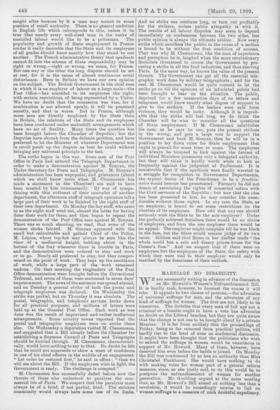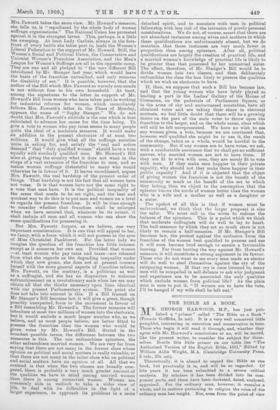MARRIAGE NO DISABILITY.
WE are necessarily writing in advance of the discussion on Mr. Howard's Women's Enfranchisement Bill. It is hardly rash, however, to forecast the course it will take. It appeals to two classes of persons,—the advocates of universal suffrage for men, and the advocates of any kind of suffrage for women. The first are not likely to be numerous. The doctrine that every man of full age not a criminal or a lunatic ought to have a vote has advocates no doubt on the Liberal benches, but they are quite aware that the change is not one to be brought aboutby a private Member. It is far from unlikely that the proceedings of Friday, being so far removed from practical politics, will hardly rise to the level of even an academical discussion. It might have been thought that the politicians who wish to extend the suffrage to women would be unanimous in support of Mr. Howard. Many of them, however, have deserted him even before the battle is joined. On Monday the Bill was condemned by no less an authority than Miss Christabel Pankhurst. She would have nothing to do with making votes for women part Of a general reform measure, since, as she justly said., to do this would be to postpone the enfranchisement of woman for another generation. Mr. Goulding argued at the same meeting that, as Mr. Howard's Bill aimed at nothing less than a revolution, it would be exceedingly unwise to link on woman suffrage to a measure of such doubtful expediency. Mrs. Fawcett takes the same view. Mr. Howard's measure, she tells us, is "repudiated by the whole body of woman suffrage organisations." The National Union has protested against it in the strongest terms. This, perhaps, is a little too sweeping. At least Lady Carlisle, always in the fore- front of every battle she takes part in, leads the Women's Liberal Federation to the support of Mr. Howard. Still, the Women's Social and Political Union, the Conservative and Unionist Women's Franchise Association, and the Men's League for Women's Suffrage are all in the opposite camp. They are one and all pledged to "the very different Bill introduced by Mr. Stanger last year' which. would leave the basis of the franchise untouched, and only removes the disability of sex." It is possible, however, that the author of the Bill which Mrs. Fawcett so warmly commends is not without foes in his own household At least, among the signatures to the letter in support of Mr. Howard's Bill from women who have taken part in working for industrial reforms for women, which immediately follows Mrs. Fawcett's letter in the Times of Monday, appears the name of " Sophy Stanger." We do not doubt that Mrs. Fawcett's attitude is the one which is best calculated to advance her cause for the time being. To give a vote to women who pay rates seems to many people quite the ideal of a moderate measure. It would make an addition to the present electorate of at most two millions. It would give what all the suffrage societies unite in asking for, and satisfy the "real and active demand" that "duly qualified women" should have a vote equally with similarly qualified men. Mr. Howard's Bill aims at giving the country what it does not want in the shape of a vast extension of the franchise to men, and so makes woman suffrage distasteful to many who would otherwise be in favour of it, It leaves unredressed, argues Mrs. Fawcett, the real hardship of the present order of things. That hardship is not the fact that all women have not votes. It is that women have not the same right to a vote that men have, It is the political inequality of the sexes that needs to be set right, and the best and quickest way to do this is to put men and women on a level as regards the present franchise. It will be time enough to consider whether that franchise shall be enlarged when we have secured that, whatever be its extent, it shall include all men and all women who can show the same qualifications for possessing it.
But Mrs. Fawcett forgets, as we believe, one very important consideration. It is one that will appeal to her, we fancy, with a force which it will not possess in the eyes of Miss Christabel Pankhurst, For the latter lady we imagine the question of the franchise has little interest except as it concerns her own sex. Provided that women —at least women who pay rates and taxes—are released from what she regards as the degrading inequality under which they now groan, she does not at present concern herself with the more general aspects of franchise reform. Mrs. Fawcett, on the contrary, is a politician as well as a suffragist, and she has no disposition to welcome enfranchisement on a revolutionary scale when her sex may obtain all that she thinks necessary upon lines identical with our present Parliamentary system. The point she does not take into account is this. If a Bill framed on Mr. Stanger's Bill becomes law, it will give a great, though possibly unexpected, force to the movement in favour of a Bill resembling Mr. Howard's. The former measure will introduce at most two millions of women into the electorate, but it would exclude a much larger number who, as we believe, and as most people believe, are better fitted to possess the franchise than the women who would be given votes by Mr. Howard's Bill. Stated in the broadest possible terms, the difference between the two measures is this. The one enfranchises spinsters, the other enfranchises married women. We are very far from saying that there are not many in the former class whose Opinion on political and social matters is really valuable, or that there are not many in the latter class who on political and social matters have no opinion at all. All that we contend is that when the two classes are broadly com- pared, there is probably a very much greater amount of the qualities we have in mind among married women than there is among unmarried women. Women are commonly able in wedlock to take a wider view of life, to deal with its difficulties in the light of a larger experience, to approach its problems in a more detached spirit, and to associate with men in political fellowship with less risk of the intrusion of purely personal considerations. We do not, of course, assert that there are not abundant instances among wives and mothers in whielx these qualifications are unfortunately absent, but we do maintain that these instances are very much fewer in proportion than among spinsters. After all, political qualifications are largely the creation of practical life, and a married woman's knowledge of practical life is likely to be greater than that possessed by her unmarried sister. The effect, therefore, of Mr. Stanger's Bill would be to divide women into two classes, and then deliberately enfranchise the class the less likely to possess the qualities which we wish an electorate to have.
If, then, we suppose that such a Bill has become law, and that the young women who have lately played so leading a part in the Ladies' Gallery of the House of Commons, on the pedestals of Parliament Square, or in the arms of shy and embarrassed constables, have all obtained votes and are taking their share in electoral contests, we feel little doubt that there will be a growing desire on the part of the male voter to throw open the franchise to the larger, and on the whole saner, class which will still be left unrepresented. We have no wish to see any woman given a vote, because we are convinced that, however well qualified she might be to use it, the result of the change, taken as a whole, would be hurtful to the community. But if any women are to have votes, we ask, with a comfortable assurance that we shall get no sufficient answer, why married women are not to have them. If they are fit to wive with men, they are surely fit to vote with men. If they make men happier in their private capacity, why should not they make them happier in their public capacity ? And if it is objected that the object of giving women the franchise is not the benefit of the couuntmity so much as the benefit of the sex to which they belong, then we object to the assumption that the spinster knows the needs of women better than the woman who is a wife and a mother as well as a daughter or a sister.
The upshot of all this is that if women must be enfranchised, we think that the larger proposal is also the safer. We must call in the wives to redress the balance of the spinsters. This is a point which we think that moderate suffragists will do well to lay to heart. The half-measure by which they set so much store is not likely to remain a half-measure. If Mr. Stanger's Bill becomes law, the protest against the exclusion f rem the franchise of the women best qualified to possess and use it will soon become loud enough to ensure a favourable hearing. Far from barring the way against Mr. Howard's measure, it will constitute a strong argument in its favour. Those who do not want to see every man made an elector will do well to steel themselves against the cry of the ratepaying woman. If that cry is once listened to, many men will be compelled in self-defence to ask why judgment and experience are to be accounted the only qualities which exclude women from political life ? As the plain man is sure to put it, "If women are to have the vote, I'll be hanged if my wife shall be left out."











































 Previous page
Previous page